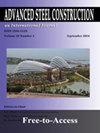采用屈曲约束支撑体系的受损建筑的耐火性能
IF 1.7
3区 工程技术
Q3 CONSTRUCTION & BUILDING TECHNOLOGY
引用次数: 8
摘要
本研究探讨了在一次严重事故中导致钢结构建筑首层柱破坏的屈曲约束支撑系统(BRBs)对结构整体防火稳定性的影响。考虑到多危险的方法,建立了一个四层弯矩框架,该框架具有倒v型支撑布置。这种技术集中在一个结构平面框架上,该框架的设计符合美国国防部指导方针的渐进倒塌标准,并假设在暴露于随后的火灾之前,一个极端事件损坏了一楼的中心柱。并与普通同心支撑体系(ocb)进行了比较,分析了brb在火灾后防止结构整体倒塌的性能。结果表明,由于brb为结构框架提供了更大的刚度,因此它们为建筑物提供了更高的整体倒塌时间。brb提供的耐火性能仅限于支撑构件和框架梁的参与。在ocb的情况下,柱在使用支撑的全部容量之前有助于结构阻力。综上所述,brb比ocb更有能力在极端事件引起的火灾中保持受损建筑的稳定性。©2018,香港钢结构学会。本文章由计算机程序翻译,如有差异,请以英文原文为准。
Fire resistance of a damaged building employing buckling restrained braced system
This study investigates the influence of buckling restrained brace systems (BRBs) on the overall structural stability against fire following a severe incident, which caused the failure of a column on the first storey of a steel building. A four-storey moment frame fitted with the inverted-V arrangement of braces is modelled, considering a multi-hazard approach. This technique concentrates on a structural plane frame that is designed to meet the progressive collapse criteria according to the U.S. Department of Defense guidelines and assumes that an extreme event damaged a first-storey centre column, before the exposure to an ensuing fire. The performance of BRBs in preventing the global collapse of the structure due to a post-event fire is compared with that of ordinary concentric brace systems (OCBs). The results indicate that BRBs offer a higher global collapse time to the building owing to the greater stiffness they provide to the structural frame. The fire resistance provided by BRBs is restricted to the participation of bracing elements and framing girders afterwards. In the case of OCBs, columns contribute to the structural resistance prior to the full capacity of braces used. To conclude, it is found that BRBs are more capable in maintaining the stability of a damaged building against fire resulting from an extreme event than OCBs. © 2018, Hong Kong Institute of Steel Construction.
求助全文
通过发布文献求助,成功后即可免费获取论文全文。
去求助
来源期刊

Advanced Steel Construction
CONSTRUCTION & BUILDING TECHNOLOGY-ENGINEERING, CIVIL
CiteScore
2.60
自引率
29.40%
发文量
0
审稿时长
6 months
期刊介绍:
The International Journal of Advanced Steel Construction provides a platform for the publication and rapid dissemination of original and up-to-date research and technological developments in steel construction, design and analysis. Scope of research papers published in this journal includes but is not limited to theoretical and experimental research on elements, assemblages, systems, material, design philosophy and codification, standards, fabrication, projects of innovative nature and computer techniques. The journal is specifically tailored to channel the exchange of technological know-how between researchers and practitioners. Contributions from all aspects related to the recent developments of advanced steel construction are welcome.
 求助内容:
求助内容: 应助结果提醒方式:
应助结果提醒方式:


